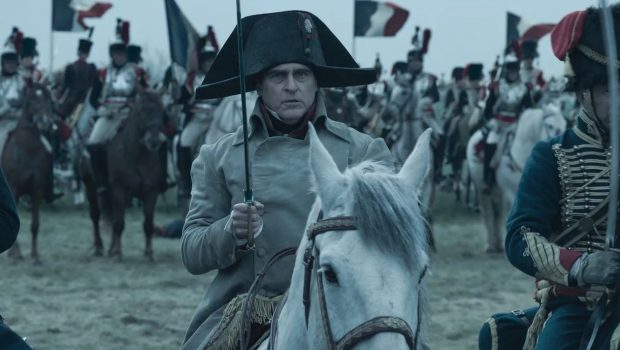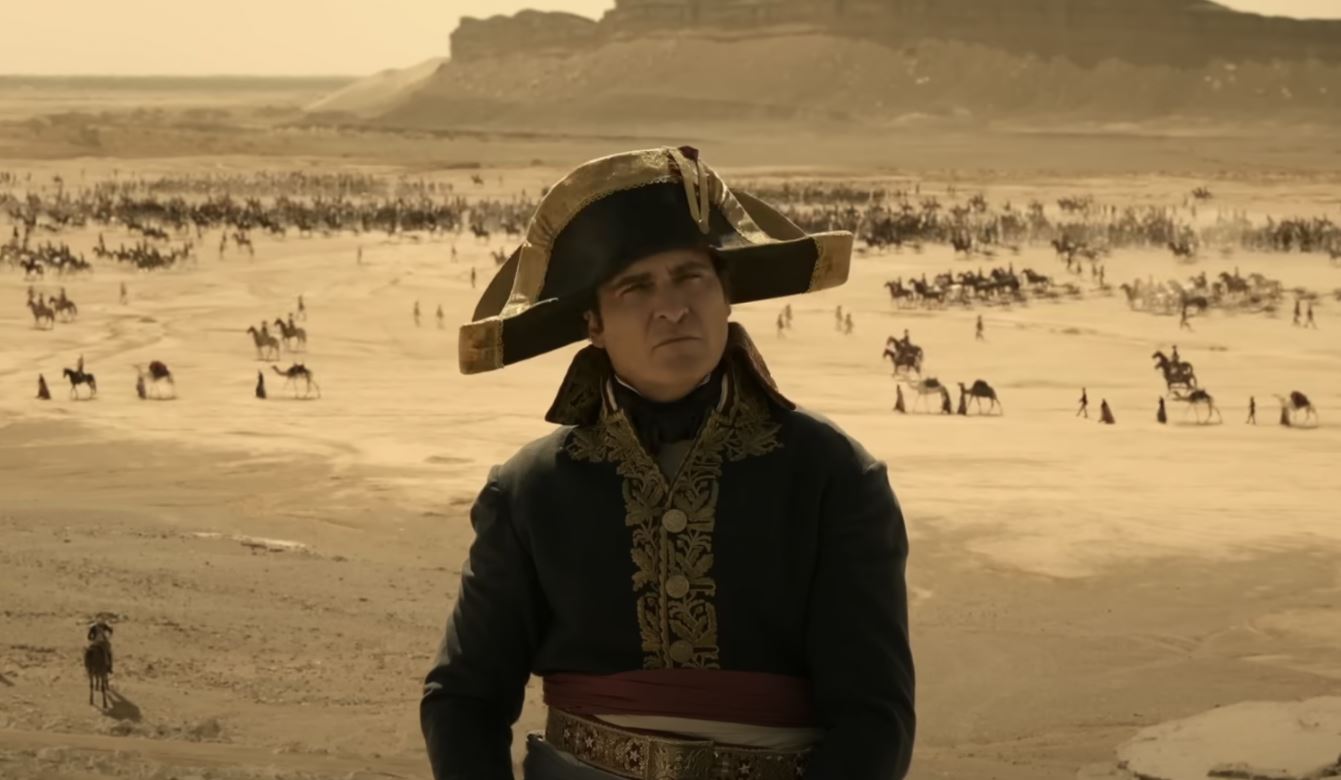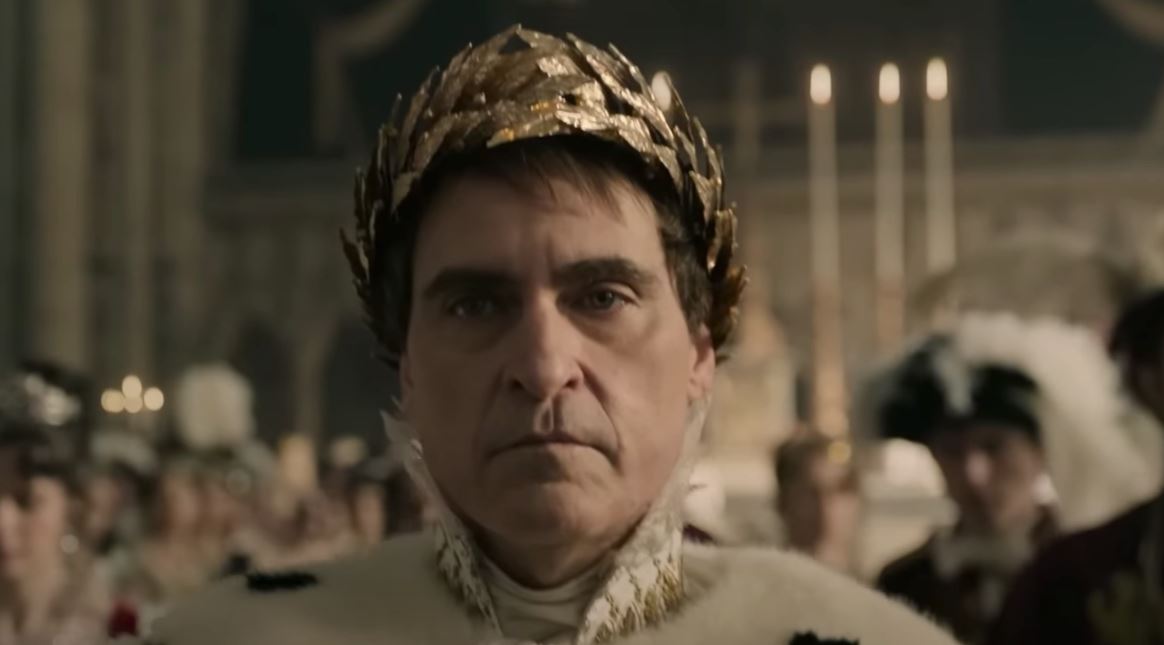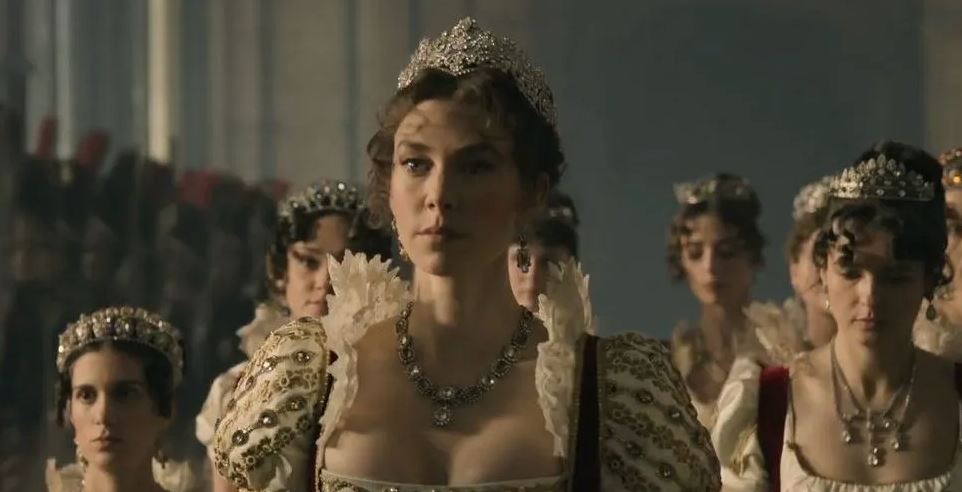Napoleon – Film Review
Reviewed by Damien Straker on the 27th of November 2023
Sony Pictures presents a film by Ridley Scott
Written by David Scarpa
Produced by Ridley Scott, Kevin J. Walsh, Mark Huffam, and Joaquin Phoenix
Starring Joaquin Phoenix, Vanessa Kirby, Tahar Rahim, Rupert Everett, and Matthew Needham
Cinematography Dariusz Wolski
Edited by Claire Simpson and Sam Restivo
Music by Martin Phipps
Rating: MA15+
Running Time: 157 minutes
Release Date: the 23rd of November 2023
Strong technical elements and violent artistry salvage this uneven historical biopic of Napoleon Bonaparte. The French conqueror and his battles across Europe have throughout various decades become a major feature of world cinema. In 1927, French director Abel Gance released a silent epic about Napoleon’s early life. Arguably, Sergei Bondarchuk’s War and Peace (1966-67) remains one of the most significant works to dramatise the damage of the Little Corporal.
At one point Stanley Kubrick contemplated his own biopic with Jack Nicholson as the Frenchman. Imagine him donning a bicorne hat with his famous dark sunglasses. Steven Spielberg has recently stated he will undertake the challenge of creating a multipart series about Napoleon. Now Ridley Scott’s film juggles brutal European warfare, the complex politics of France itself, and the inner life Napoleon shared with his wife, Josephine. There are scenes of enormous visual prowess, but Scott never draws the threads together as coherently as expected. The film is like its subject matter: ambitious but unwieldly and a victim of overreaching.
Joaquin Phoenix gives a steady, quietly intense performance as Napoleon. The film starts in 1793 as the French gunner leads various battles against the English and quickly rises through the leadership ranks of France’s military. He and his brother (Matthew Needham) also use the military to their personal advantage. With support from politicians such as Paul Barrass (French actor Tahar Rahim), they overthrow the government and seize power for themselves. The Coup of 18 Brumaire results in the French Revolution’s end and Napoleon becoming emperor.
Meanwhile, Napoleon also starts courting an impoverished woman named Josephine (Mission: Impossible – Fallout’s Vanessa Kirby). Their relationship initially blossoms until they have trouble conceiving a child together. The pressure and desperation for Napoleon to have a male heir who will prolong his legacy quickly sees their marriage disintegrate.
Even as their relationship wilts, they continue writing letters to each other while Napoleon is away fighting. Many of these global conflicts staged between France, Russia, and England result from complex disagreements over trade. Despite several pivotal victories over his enemies, his failure to successfully invade Russia and defeat Alexander I (Édouard Philipponnat) leads to many in France to grow weary and begin plotting his downfall.
It is either the script by David Scarpa (All the Money in the World, 2017) or wonky editing that robs Napoleon of coherency. One example is the film’s central relationship. The point is hammered repeatedly that the couple is unable to conceive a child. It is a pivotal story moment that results in their divorce and Napoleon bedding his mistress. Yet given how their love scenes progress, Napoleon and Josephine might have benefited from a few adult education classes!
Another loose thread involves Napoleon’s jealousy. He dislikes the idea of Josephine having affairs and she rightfully highlights his hypocrisy. When he divorces her, he immediately wants to remain in contact. Are his relationships another expression of personal conquest or are we missing a scene or two? The end titles say his last words were: ‘France, Armies, Josephine’. While likely fabricated, it is still a belated attempt to discover the story’s through-line.
Some have argued this interpretation of Napoleon deliberately embraces political satire. The question is whether Scarpa’s dialogue reflects this mode or if it is unintentionally clumsy. In one scene, Napoleon sounds like a petulant child when he tells a rival: ‘you think you’re so great just because you have boats!’ Moments like this jar but are less worrisome than the script’s major shortcomings. No one outside of Napoleon and Josephine is well developed. Napoleon’s brother is thinly realised and fades in and out of proceedings. Though he appears in one of the film’s best scenes: a moment of slapstick where the brothers stage a political coup.
Fortunately, Napoleon is salvaged by Scott’s steady hand, including superb technical components. This is a huge, lavish production and often pitched around busy crowd scenes even before reaching the violent battlefield. There are some amazing set pieces designed by Scott and his cinematographer Dariusz Wolski. The introduction where Marie Antoinette is executed is a visually stunning opening to the mayhem of France and its cultural upheaval.
The scale of the jaw dropping battle scenes are further enhanced when seeing the film on an enormous IMAX screen. These are violent, chaotic collisions where human bodies and horses continue to pile over one another. Fortunately, amidst the heavy overcast of the grey battlefield where rifles and cannonballs dominate, Scott still specifies grizzled, violent imagery.
In one confronting shot, Napoleon’s horse is torn apart by a stray cannonball. Moments later, ladders are raised as French troops overthrow a British stronghold. One of the most striking images though is when the weather elements dominate the Battle of Austerlitz. Russian soldiers flee across the ice only to plunge into the frozen depths below. The way Scott’s camera follows their watery descent is exciting and vivid. The amount of gore throughout the film forms a necessary counterpoint to the spate of bloodless, overly sanitised blockbusters.
Scott ensures we witness tactical changes during combat, particularly during the Battle of Waterloo. The English soldiers huddle together into defensive squares, so it is harder for them to be slaughtered by Napoleon’s forces. The Duke of Wellington (Rupert Everett) comments that when it comes to fighting Napoleon cannot resist a frontal assault. Evidently, the superb production design by Arthur Max, impeccable costumes by David Crossman and Janty Yates, and Scott’s insistence on using hundreds of extras have resulted in devastating combat imagery.
The two lead performances cannot be faulted because Joaquin Phoenix and Vanessa Kirby bring the right levels of intensity to their roles. Phoenix in particular looks appropriately heavy-eyed and tired from the fighting Napoleon has endured. The focus of his gaze proves a solid replacement for the manic energy the actor usually employs. Kirby has a strong moment where she underlines their inseparability from each other. Clearly it is their ambition that unifies them. The mixture of British and American accents is odd though. Almost everyone in the cast is also speaking English. It’s a strange decision given the film’s otherwise close attention to detail.
Napoleon is a far-reaching but wildly uneven production. The relationship between Napoleon and Josephine is thematically removed from the rest of the film. It doesn’t help that portions of the story have seemingly been left behind. It renders events disjointed as Napoleon teleports his way around Europe. Hopefully Scott’s inevitable director’s cut will draw the loose story ideas together. Nonetheless, the film stuns on a large screen because of the incredible battles.
The amount of skill involved with constructing these intense action scenes is stunning to behold. Lastly, Phoenix remains one of the most fascinating actors to watch on camera. Even when the material falls short, he carries the film with magnetic intensity. In its current state the film only receives a pass mark, but one hopes in the future a complete version will prevail.
Summary: Strong technical elements and violent artistry salvage this uneven historical biopic of Napoleon Bonaparte.










